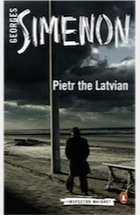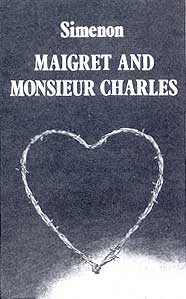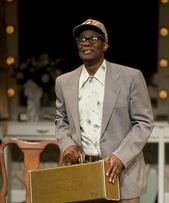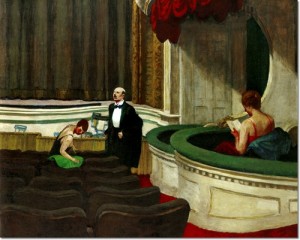 “Q: What great singers of the past do you wish had sung your music?
“Q: What great singers of the past do you wish had sung your music?
“A: Nobody really. Well, actually, Fred Astaire.”
Stephen Sondheim (quoted in the Philadelphia Inquirer, Feb. 19, 2009)
Terry Teachout on the arts in New York City
 I’ve been thinking about something that I posted last week apropos of my decision to start reading my way through George Simenon’s seventy-five Maigret novels in the order of their writing:
I’ve been thinking about something that I posted last week apropos of my decision to start reading my way through George Simenon’s seventy-five Maigret novels in the order of their writing:
Why, then, haven’t I read more Maigret novels? In part because there are so many of them, making it hard to know where to dive in—but also because they’ve been reprinted virtually at random over the years. Because I have an orderly mind, I’m reflexively disinclined to fish at random in so monstrously large an oeuvre. I like to know where to start, and I like, when possible, to begin at the beginning and proceed from there.
I’ve now read the first four, and another point occurred to me somewhere along the way. When you start exploring so large an oeuvre at random, you never know where you are in your journey to the end of the shelf. While I read primarily—exclusively, insofar as possible—for pleasure, I do like to feel, illusory though the sensation may be, that I’m getting somewhere. When I started reading Trollope, I began, as do most people, with the Palliser novels, about which I knew at the time only that there were six of them and that they formed a sequence that is far easier to understand when read in order. Hence that was what I set out to do, and by the time I got to The Duke’s Children, I knew I was almost finished. That’s my idea of the idea of progress.
The Maigret novels, of course, don’t work that way. Unlike, say, P.G. Wodehouse’s novels about Jeeves and Bertie Wooster, which can easily be read out of sequence but do nevertheless progress (in a manner of speaking) from volume to volume, they are separate and independent entities, free-standing stories that have nothing in common save for the continuing presence of Inspector Maigret. On the other hand, they were written and published over a very long period of time—from 1931 to 1972—and presumably Simenon’s style evolved throughout that period. Or maybe not: I simply don’t know. But I will know if I read them in order, and because I’m a critic with an orderly mind, I’m going to do just that.
 And does it matter? Perhaps not. Probably not, truth to tell. It may be that the only thing besides pleasure that I’ll get out of making my systematic way through Maigret’s adventures is the knowledge of how many more of them I have left to read. Well, that’s fifteen down and sixty to go, I’ll be able to say at some indeterminate point in the future (assuming that I live that long and don’t give up between now and then).
And does it matter? Perhaps not. Probably not, truth to tell. It may be that the only thing besides pleasure that I’ll get out of making my systematic way through Maigret’s adventures is the knowledge of how many more of them I have left to read. Well, that’s fifteen down and sixty to go, I’ll be able to say at some indeterminate point in the future (assuming that I live that long and don’t give up between now and then).
In short, I’ll know where I am—and I hasten to admit that this particular piece of knowledge is almost certainly a meaningless consideration, mere obeisance to one of my psychic quirks. Life itself, after all, is a confused and confusing business, and the older I get, the more inclined I am to agree that (in the words of my favorite song from The 25th Annual Putnam County Spelling Bee) Life is random and unfair/That’s the reason we despair/Life is pandemonium! This disagreeable reality, I suspect, is part of the reason why it matters to me to know that I have seventy-one more Maigret novels to read before I run out of new ones and must start afresh—or, even better, try something new.
Truth to tell, it probably also explains why so many of us are so strongly disposed by nature to expend so much energy establishing other, comparably trivial reigns of order. Whether it’s a meticulously catalogued stamp collection, a fanatically tidy living room, or a never-to-be-altered ritual breakfast menu, we can point to the results and assure ourselves that while we may not have much control over the world, at least we have that much.
A tiny victory? Well, it’s better than nothing. Slightly better, anyway.
Like most of us, I don’t read enough short stories, and wonder why I don’t. After all, I have a special liking for the focus and concentration of art songs and small paintings, and short stories offer the same sort of microcosmic experience. Whenever I pick up a volume of favorite stories, I invariably put it down refreshed. I tossed the first book on this list into my suitcase the other day, read it on the road, and resolved for the umpteenth time to change my ways. …
Read the whole thing here.
 John Douglas Thompson has won the prestigious Drama Desk Award for Outstanding Solo Performance in Satchmo at the Waldorf, my first play, which is currently running off Broadway at the Westside Theatre.
John Douglas Thompson has won the prestigious Drama Desk Award for Outstanding Solo Performance in Satchmo at the Waldorf, my first play, which is currently running off Broadway at the Westside Theatre.
Here’s what it means, from the official website:
Drama Desk Awards, which are given annually in a number of categories, are the only major New York theater honors for which productions on Broadway, Off-Broadway and Off-Off Broadway compete against each other in the same category. Formed in 1949 by a group of New York theater critics, editors, reporters, and publishers, the organization was created to educate the community on vital issues concerning the theater.
I’m thrilled. He’s thrilled. We’re all thrilled.
To see who else won, plus a complete list of nominees, go here.
If you haven’t seen Satchmo at the Waldorf yet, time is running out—don’t wait. Go here to order tickets or for more information.
 Now available in streaming video, here’s the latest episode of CUNY-TV’s Theater Talk, which aired over the weekend.
Now available in streaming video, here’s the latest episode of CUNY-TV’s Theater Talk, which aired over the weekend.
The official blurb:
Theater Talk welcomes critics Ben Brantley of The New York Times, Peter Marks of The Washington Post and Terry Teachout of The Wall Street Journal, reviewing some of the important productions of the Spring 2014 Broadway season.
We had fun taping it. I hope you have fun watching it:
 Just as I promised, Mrs. T and I pulled up stakes last Tuesday, made our unhurried way to the Connecticut coast, and checked into a cozy room at the Inn at Stonington, the place where Hope Springs was filmed. (While we were at it, we also went to Mystic Pizza.) We then spent the rest of the week doing nothing in particular. Instead of going to shows and writing about them, I slept late, ate good dinners, relished the salt air, drove randomly around the countryside, watched Citizen Kane and the first episode of John Malkovich’s passably promising new network TV series, read in bed, listened to Chopin and William Walton, and otherwise played professional hooky. Neither of us was remotely ready to go back home when our little holiday was over.
Just as I promised, Mrs. T and I pulled up stakes last Tuesday, made our unhurried way to the Connecticut coast, and checked into a cozy room at the Inn at Stonington, the place where Hope Springs was filmed. (While we were at it, we also went to Mystic Pizza.) We then spent the rest of the week doing nothing in particular. Instead of going to shows and writing about them, I slept late, ate good dinners, relished the salt air, drove randomly around the countryside, watched Citizen Kane and the first episode of John Malkovich’s passably promising new network TV series, read in bed, listened to Chopin and William Walton, and otherwise played professional hooky. Neither of us was remotely ready to go back home when our little holiday was over.
Not only did I put aside all thought of work, but I kept yet another promise by eschewing the department of literature that Jeeves called “improving books,” plunging straight into George Simenon’s Pietr the Latvian and The Late Monsieur Gallet, the first two Maigret novels. They are plain, laconically told tales of violence and obsession set against a contrasting backdrop of ordinary bourgeois life, and I found them as diverting in their quintessentially French way as the mysteries of Rex Stout, the spy stories of William Haggard, or the crime novels of Elmore Leonard. I expect I’ll be reading a great deal more about Inspector Maigret from now on.
Having recently heard of yet another study which purports to demonstrate that vacations provide no long-lasting psychological benefits to those who take them, I take leave to sneer at science. No doubt it’s true, but so what? I enjoyed our four days off more than I’ve enjoyed anything that’s happened to me in recent weeks—except, of course, for this.
 Above all, I enjoyed driving around Stonington and its environs with Mrs. T, gazing with pleasure at eighteenth- and nineteenth-century seaside houses and stopping wherever and whenever it suited us to do so. What’s more, I was delighted to learn that my brother and sister-in-law, in a perfect interfamilial harmonic convergence, took the same week off and spent it in Gatlinburg, the Tennessee resort town to which my parents brought David and me many times in our youth (and to which I returned seven years ago on a sentimental journey).
Above all, I enjoyed driving around Stonington and its environs with Mrs. T, gazing with pleasure at eighteenth- and nineteenth-century seaside houses and stopping wherever and whenever it suited us to do so. What’s more, I was delighted to learn that my brother and sister-in-law, in a perfect interfamilial harmonic convergence, took the same week off and spent it in Gatlinburg, the Tennessee resort town to which my parents brought David and me many times in our youth (and to which I returned seven years ago on a sentimental journey).
I love my life, but I also love being able to step outside it and let the world happen to me in its own good time. That’s what it means to go on a holiday, if it means anything at all. I eat far too many meals with one eye on the clock and read far too many books in order to write about them. It took me long enough to learn the importance of taking breaks from my daily rounds, gratifying though they are, and I expect to continue taking as many as I can before those rounds draw at last to their inescapable close.
 An extremely rare clip of Ethel Merman appearing on Gypsy, Gypsy Rose Lee’s TV talk show, in 1965. The segment includes footage from home movies shot at rehearsals for the original Broadway production of Gypsy, which was freely based on Lee’s life:
An extremely rare clip of Ethel Merman appearing on Gypsy, Gypsy Rose Lee’s TV talk show, in 1965. The segment includes footage from home movies shot at rehearsals for the original Broadway production of Gypsy, which was freely based on Lee’s life:
(This is the latest in a series of arts-related videos that appear in this space each Monday and Wednesday.)
| M | T | W | T | F | S | S |
|---|---|---|---|---|---|---|
| 1 | 2 | 3 | ||||
| 4 | 5 | 6 | 7 | 8 | 9 | 10 |
| 11 | 12 | 13 | 14 | 15 | 16 | 17 |
| 18 | 19 | 20 | 21 | 22 | 23 | 24 |
| 25 | 26 | 27 | 28 | 29 | 30 | |
An ArtsJournal Blog